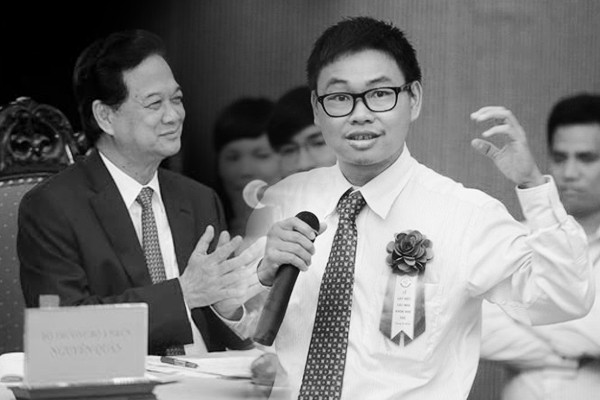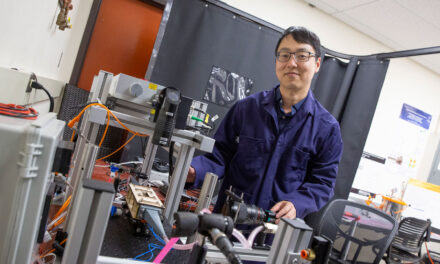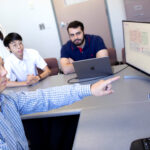
Former HEEAP cohort participant to receive up to $33 million to produce “smart glasses”

Ba Hai Nguyen had his “smart glasses” financed by Vietnamese Prime Minister Nguyễn Tấn Dũng at a meeting at the Ministry of Science and Technology. Photo courtesy of Ba Hai Nguyen
After Ba-Hai Nguyen’s presentation on his “smart glasses,” which help people that are visually impaired get around, Vietnamese Prime Minister Nguyễn Tấn Dũng asked for more details at a meeting in September. The Prime Minister then made the decision to finance the million-dollar project of manufacturing the glasses for all Vietnamese people that are visually impaired. The meeting between young scientists and the prime minister took place at the Ministry of Science and Technology.
Nguyen, a lecturer at the Ho Chi Minh City University of Technology and Education, has intended to produce the smart glasses since he was a student but lacked the opportunity until he returned to Vietnam in 2010 after studying overseas. The glasses are programmed to recognize obstacles and vibrate to alert users so that they can find their way around.
He participated in a Higher Engineering Education Alliance Program (HEEAP) faculty development training in 2012 at Arizona State University. HEEAP is a partnership among the United States Agency for International Development (USAID), ASU’s Ira A. Fulton Schools of Engineering and Intel. It launched in June 2010 to help improve the quality of higher education, specifically in mechanical and electrical engineering in Vietnam.
“The HEEAP program has given me a really good chance to learn new working styles, the knowledge of a new model of transforming higher education learning and research,” Nguyen said. “During that time, experts at ASU were really helpful and supported me and my colleagues.”
Jeff Goss, executive director for the Office of Global Outreach and Extended Education and assistant dean in the Fulton Schools, has influenced Nguyen with his passion. “He transfers his fire to me anytime we meet and I get a lot of inspiration and innovation from his mindset, working method and expertise,” he said. “These meetings give me more confidence to overcome tough moments during my research career and gain several small results step-by-step during last three years.”
“Those small results are evidenced by my discussion with Prime Minister Nguyễn Tấn Dũng and the happy moment for all the people who are sight-impaired in Vietnam happens because of that unique passion.”
The first version of the glasses weighed two kilograms and had a production cost of approximately VND20 million (nearly $1,000). After nine upgrades the smart glasses now weigh only 200 grams and have a production cost of VND2 million (less than $100). With product quality as high as similar foreign products and significantly lower production costs, Nguyen has received many orders for the glasses, even from overseas. They are robust with an aluminum frame and a high capacity battery of three days. The glasses were given a patent last year and feature obstacle avoidance with a novel method of displaying haptic feedback for the visually impaired and intuitive interface design which allows users to “feel” the distance, position and direction of obstacles in their path as well as to know the battery level.
Vietnam currently has 1.2 million people who are sight-impaired, of which about 300,000 are legally blind. Nguyen previously turned down an offer to commercialize the “smart glasses” as he wished to donate his invention to the State so that it could help deliver the high-tech product to sight-impaired people at the lowest cost.
Nguyen, who will be leading the University of Technology and Education’s newly launched School of Innovation Entrepreneurship, said his biggest takeaway from his involvement with HEEAP is the inspiration to innovate and make sustainable changes in both education and research in Vietnam with the slogan “learn globally and apply locally.”
Media Contact
Erik Wirtanen, [email protected]
480-727-1957
Ira A. Fulton Schools of Engineering



































